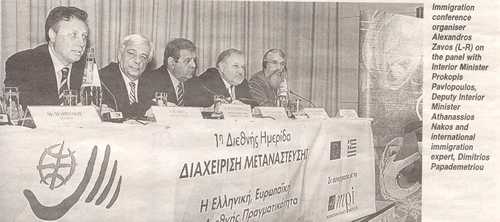 Immigrant 'registration' by June - Athens News International expert tells an Athens conference that immigration is one of the most demanding and difficult topics to tackle, but also the most consequential for the future of Greece By Kathy Tzilivakis |
|
Greece needs to replace its existing immigration policy as quickly as possible, Interior Minister Prokopis Pavopoulos announced on November 15. But to do so it first needs to gather information on the number of immigrants in the county. "Immigrants are people who can and should contribute to the Greek society, the Greek economy and Greek culture," said Pavopolous. He called existing immigration legislation in Greece "inadequate" and said Greece needs "to establish a comprehensive immigration policy, one that has continuity". Pavlopoulos was addressing the first annual international conference on immigration organized by the Hellenic Migration Policy Institute (IMEPO) in Athens. Representatives from six countries attended the conference co-organized by the Washington-based Migration Policy Institute - a think-tank headed by migration expert Demitrios Papademetriou. Promoting the government's decision to carve out a new immigration policy, Pavlopoulos announced plans for a nationwide "registry" of the immigrants in the country. He did not offer details, however, on what this massive effort will entail logistically or offer a timeline. Nor did he make reference to the probable legislation of an estimated 300,000 undocumented migrants residing in Greece. Nevertheless, government plans to proceed with its third blanket amnesty - extensively reported by the Greek media - have recently been confirmed by sources at the interior ministry. "Our goal is to complete the registration of all those who are in Greece as soon as possible, June at the latest, because policymaking must take this into account," Pavlopoulos told the conference, suggesting a push for new legislation as early as next autumn. Previous amnesty laws came in 1998 and 2001. The government's first step has been to assign IMEPO to furnish policymakers in the coming months with comprehensive statistics about the country's immigrant population. IMEPO director, Alexandros Zavos, told reporters on November 11 that the interior ministry data do not account for about 150,000 immigrants. A "superior" lawIn his opening remarks, the minister stressed that Greece - once a country of emigration - was not prepared to deal with the sudden influx in immigrants in the 1900s. This, he said, must change for many reasons, including the need to combat the growing anti-immigrant sentiments among Greeks. As for the European Union's recent decision finally to forge common immigration and asylum policies by 2010, the minister announced that any new legislation passed in Greece will be "superior" to that in even the most progressive member states. Such ambitious standards, he explained, are necessary because of Greece's unique geographical position: Greece is the only EU country that does not border any other member state. It is also one of the few members states in which people hailing from a single country (here, Albania) make up more than 50 percent of the total number of immigrants. According to Pavlapoulos, new "serious" policy will also delve into issues related to the political hot potato of legal immigration - how foreigners can legally enter the country. In June, Prime Minister Costas Karamanlis indicated that the demands of the labour market should determine how many economic immigrants are allowed legally reside in Greece Some numbersAccording to IMEPO director, Alexandros Zavos, immigrants in Greece make up between 7 and 10 percent of the country's population. More than half are Albanians, about 12 percent of immigrants in Greece are self-employed, entrepreneurship. The majority, or 70 percent, are workers. In Athens, immigrants make up 17 percent of the city's population. They represent about 7 percent of residents in Thessaloniki, northern Greece. The children of immigrants represent about 6.7 percent of all students enrolled in Greek public schools. "And the number keeps rising," said Zavos. "The smooth integration of immigrants is a top priority for Greece," he told the conference. "The government is starting to draft new immigration policy that include integration measures and assistance to local immigrant communities, as well as language-learning initiatives." The former socialist Pasok government had also put the integration of immigrants into Greek society and the national labour market high on he national agenda. Yet the big budget 260 million euro integration programme announced in 2003 never got off the ground. Better Immigration ManagementPapademetriou whom Zavos referred to as an international immigration "guru", is assisting the government in drafting new policy. He previously lent his expertise during Greece's stint at the six-month rotating presidency of the EU last year. According to Papademetriou immigration is one of the topics that will be the "most demanding and difficult to tackle as well as most consequential for the future of Greece". He outlined four interdependent policy guidelines to improve the management of migration channels, stricter internal policy enforcement, and more diplomacy with the border countries to facilitate border control. His last point was to stress that integration is the toughest and most imperative aspect of international migration. Immigrants will come and later bring their families and in half a century they will be indistinguishable from the rest of society. Thus, all aspects of the society - government, civil society, and the business sector - are affected and involved. Integration is not an afterthought.
|

